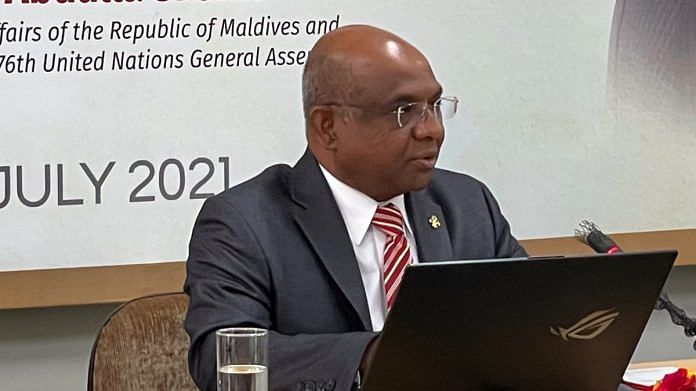New Delhi: Abdulla Shahid, Foreign Minister of Maldives, said his country will remain the “heart of the Indian Ocean” and hence it has to ensure that the region does not turn into a “zone of conflict” or is used by “non-state actors”.
In an exclusive interview to ThePrint, Shahid, who was elected President of the 76th session of the United Nations General Assembly (UNGA) in June, said his first and foremost responsibility would be to ensure that the stability, security and prosperity of the Indian Ocean remained intact.
“Land wise, Maldives might be very small but we are a very large ocean state. Our territory is large, our wealth is in the ocean. So we need to make sure that the wealth is not taken away from us, that our territory is not used by non-state actors — be it terrorists, mercenaries, pirates, or for that matter, narco-terrorists,” he said.
Shahid, who met Prime Minister Narendra Modi and External Affairs Minister S. Jaishankar here last week, also said the Ibrahim Mohamed Solih government will not allow the Maldivian territory to be used by anyone, and thus it is important that the Trilateral Maritime Security Cooperation at the level of the national security advisors (NSA) between India, Maldives and Sri Lanka should continue.
The 4th NSA-Level Meeting on Trilateral Maritime Security Cooperation was last held in November 2020 after a long hiatus.
“We do not want our territory to be used for any purpose like that and it’s only through international cooperation especially among the immediate neighbours, cooperation within us that could prevent things like that. That is why the trilateral security dialogue is so important,” he said.
Shahid added that the dialogue should continue. “I think it is a very strategic process. Sri Lanka is geographically closest to Maldives and India is the closest and largest neighbour. Together the three countries could contribute to maintaining peace and security in the region, especially in the Indian Ocean.”
Former Maldives President Mohammad Nasheed, now the Parliamentary Speaker, was attacked in May 2021, allegedly by terrorists, fuelling the long-term concerns on the presence of radical elements, such as ISIS and al-Qaeda, among others, there.
Also read: Like them or not, Taliban are a reality. India can deal with them if BJP resets its politics
At the heart of the Indian Ocean
Maldives will always remain the “heart of the Indian Ocean” due to its location, and so it recognises its responsibility towards this region at large, Shahid added.
“We will never be able to move Maldives from where we are to any other place. There is a responsibility on the Maldives to maintain and contribute to peace and stability and prosperity in the Indian Ocean,” he stressed.
“Our own development, prosperity, stability and peace is dependent on the prosperity of the Indian Ocean. If the Indian Ocean becomes a zone of conflict then Maldives is going to suffer. So we on, our part, will do everything possible to maintain peace, security, stability and prosperity in the Indian Ocean. That is in our own self-interest,” Shahid added.
He said this is one of the main reasons why Maldives has joined the Indian Ocean Rim Association under President Solih.
‘Friends to all, enemies to none’
Ever since President Solih came to power in November 2018, ties between India and Maldives “flourished and cooperation between the two sides” have reached unprecedented levels, said Shahid.
Under the previous government of President Abdulla Yameen, Maldives had witnessed a heavy tilt towards Beijing.
“The strategic political importance is something that is of very recent past. But the relationship has really flourished after President Solih came to office … The understanding between the two leaders (Solih and Prime Minister Narendra Modi) has paved the way for a level of cooperation and friendship between our two countries as we have never seen before,” he said.
Prime Minister Modi was the first world leader to visit Maldives after President Solih came to power. Subsequently, President Solih chose India as his first destination abroad for a bilateral visit in December 2018 when Modi offered Maldives an economic package of $1.4 billion.
“…for President Solih, we are friends to all and we are enemies to none. President Solih came to office promising engagement with the international community. He is engaging with all countries,” the minister said.
“We have restored diplomatic relations with Qatar, which was severed during President Yameen’s time. We have re-joined the Commonwealth, which Maldives left during President Yameen’s time. So we are back into the international community, talking to everyone, working with everyone,” Shahid highlighted.
‘Afghanistan security situation concerns all’
The situation in Afghanistan is a “matter of concern” not only for the world but also for its immediate neighbours in South Asia, Shahid said.
“But the Afghan people are resilient people. The Afghan government is a democratically established, elected government and we wish them all the best,” he added.
He also assured that as the next UNGA president, he would once again reiterate Maldives’ demand for the reform of the UN Security Council (UNSC), which seeks to give a larger voice to developing countries.
(Edited by Paramita Ghosh)
Also read: Abdullah Abdullah meets Jaishankar as Kabul plans massive retaliation against Taliban



